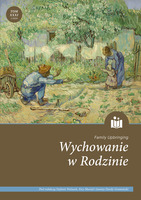Językowe wsparcie dzieci i rodzin migracyjnych na przykładzie rozwiązań Familienzentrum Lebenshilfe w Elmshorn
Linguistic support for migrant children and families on the example of the solutions of the Familienzentrum Lebenshilfe in Elmshorn
Author(s): Katarzyna Sadowska, Kinga Kuszak, Marta Jadwiga KędziaSubject(s): Family and social welfare, Welfare services, Migration Studies
Published by: Zakład Historii Edukacji w Instytucie Pedagogiki Uniwersytetu Wrocławskiego
Keywords: Linguistic support; migration family; Familienzentrum Lebenshilfe; Urie Bron- fenbrenner’s theory; child in a migration situation;
Summary/Abstract: Introduction. Due to the currently intensifying phenomenon of migration, one of the par- ticular challenges of the 21st century is cultural, educational, and linguistic support for migrants in the receiving countries. It is important that a child who finds itself in a position of dependence on the decisions of adult guardians, functioning in the space of a country that is previously foreign to it, experiences language education in a broad socio-cultural context, taking into account the interactions and interpenetration of the microsystem, me- sosystem, exosystem, macrosystem, and chronosystem.Aim. The aim of the study is to show linguistic support for migrant children and families on the example of the Familienzentrum Lebenshilfe in Elmshorn in the Pinneberg. The following are considered important for creating methodological premises for the langu- age education of a migrant child: the process of language education in a broad socio- -cultural context, taking into account the interactions and mutual interpenetration of the microsystem, mesosystem, exosystem, macrosystem and chronosystem (in the context of the ecological theory of Urie Bronfenbrenner’s concept of human development). Re- search problem: The main problem is: How are migrant children and families staying in Elmshorn supported in the linguistic field through the solutions of the Familienzentrum Lebenshilfe (in the context of Uri Bronfenbrenner’s ecological concept of human deve- lopment)?Materials and methods. During the study visit (December 11-14, 2022) the authors car- ried out a diagnostic survey using the technique of participant observation of classes ta- king place at the Familienzentrum, non-participant observation conducted in educational institutions associated with and cooperating with the Familienzentrum, and informal inte- rviews with employees (psychologists, educators, social activists, director).Results and conclusion. The authors discuss a child in a migration situation, challenges in the process of multicultural integration in the example of Germany, and ways of sup- porting migrant families in the process of immersion in the language, and in the context of strengthening the microsystem and creating a mesosystem on the example of the Familien- zentrum Lebenshilfe . All solutions proposed in the examined institution provide a chance for reliable linguistic and social support for migrant children and families.
Journal: Wychowanie w Rodzinie
- Issue Year: XXXI/2024
- Issue No: 1
- Page Range: 45-56
- Page Count: 22
- Language: Polish

